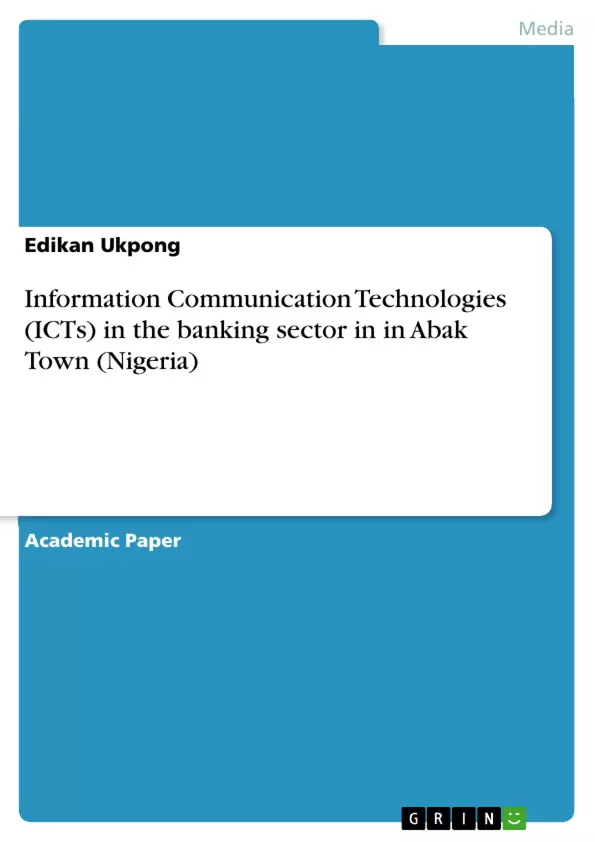Over the years, the advent of Information Communication Technologies has brought remarkable changes to the way people live their live and do businesses today. Most sectors of our economy both nationally and globally are fast adopting the use of Information and Communication Technologies to advance the course of their duties; to enhance quality customers’ service delivery and internal operations. This has brought about remarkable development in these sectors of our economy. Most specifically to the context of this work, the banking industry in Nigeria has undergone remarkable development strides in the bid to improve on the quality of service rendered to its customers and to enhance the profitability of its internal operation.
Table of Contents
- INTRODUCTION
- Background to the Study
- Statement of the Problem
- Research Objectives
- Research Questions
- Significance of the Study
- Scope of the Study
- Definition of Terms
- REVIEW OF RELATED LITERATURE
- CONCEPTUAL REVIEW
- INFORMATION AND COMMUNICATION TECHNOLOGY
Objectives and Key Themes
This study aims to assess customers' perception of the use of Information and Communication Technologies (ICTs) in select banks in Abak town, Nigeria, focusing on its impact on service delivery and internal operations. It investigates the extent to which ICTs have influenced bank performance, how they enhance service quality, and the challenges associated with their implementation.
- Impact of ICTs on bank performance in Abak town.
- Customer assessment of ICT use in enhancing service delivery.
- The role of ICTs in improving the efficiency of internal banking operations.
- Challenges faced in the implementation and use of ICTs in the banking sector.
- The relationship between customer satisfaction and the speed of service delivery facilitated by ICTs.
Chapter Summaries
INTRODUCTION: This introductory chapter sets the stage for the study by exploring the transformative impact of Information and Communication Technologies (ICTs) on various sectors, particularly the banking industry in Nigeria. It highlights the growing impatience of customers and the banking sector's response through the adoption of advanced technologies like ATMs and POS systems. Despite these advancements, customer satisfaction remains a concern, prompting the study to investigate customer perceptions of ICTs' influence on service delivery and internal operations within select banks in Abak town. The chapter clearly states the problem, objectives, research questions, significance, scope, and defines key terms related to the study.
REVIEW OF RELATED LITERATURE: This chapter delves into a conceptual review of Information and Communication Technologies (ICTs), banking in Nigeria, and the interplay between the two. It draws upon various scholarly sources to define ICTs, highlighting their dynamic role in economic growth and their application in automating business processes. The chapter explores how ICTs have revolutionized banking, leading to increased efficiency, cost reduction, and diversified income streams. The review includes insights from prominent researchers on the impact of ICT adoption in the banking sector and introduces multiple perspectives on the subject, building a strong foundation for the research study. Specific examples are given regarding credit scoring, process efficiency, and branch renewal, illustrating the transformative influence of ICTs on banking practices.
Keywords
Information and Communication Technologies (ICTs), Nigerian Banking Sector, Customer Service, Service Delivery, Internal Operations, Bank Performance, Customer Assessment, Technology Adoption, Efficiency, Challenges.
Frequently Asked Questions: A Comprehensive Language Preview
What is the overall focus of this study?
This study assesses customers' perception of Information and Communication Technologies (ICTs) in banks in Abak town, Nigeria, analyzing its impact on service delivery, internal operations, and overall bank performance. It investigates how ICTs enhance service quality and identifies challenges in their implementation.
What are the key objectives of the research?
The research aims to determine the impact of ICTs on bank performance in Abak town, evaluate customer assessment of ICT use in enhancing service delivery, explore the role of ICTs in improving internal banking operations, identify challenges faced in ICT implementation, and analyze the relationship between customer satisfaction and service delivery speed facilitated by ICTs.
What key themes are explored in the study?
Key themes include the impact of ICTs on bank performance, customer perception of ICT-enhanced service delivery, the role of ICTs in improving internal operations, challenges in ICT implementation within the banking sector, and the correlation between customer satisfaction and ICT-driven service speed.
What topics are covered in the "Review of Related Literature" chapter?
This chapter provides a conceptual overview of ICTs, Nigerian banking, and their interaction. It examines ICT's role in economic growth and business process automation within the banking sector, exploring efficiency gains, cost reductions, and diversified income streams resulting from ICT adoption. It also incorporates insights from existing research on ICT's impact on banking, including examples related to credit scoring, process efficiency, and branch renewal.
What does the introduction chapter cover?
The introduction sets the context by discussing the transformative impact of ICTs on various sectors, especially the Nigerian banking industry. It highlights customer expectations and the banking sector's response through technological advancements. It clearly outlines the research problem, objectives, questions, significance, scope, and defines key terms.
What are the key words associated with this study?
Key words include: Information and Communication Technologies (ICTs), Nigerian Banking Sector, Customer Service, Service Delivery, Internal Operations, Bank Performance, Customer Assessment, Technology Adoption, Efficiency, Challenges.
What is the structure of the document preview?
The preview provides a comprehensive overview including the title, table of contents, objectives and key themes, chapter summaries, and keywords.
What type of data is presented in this document preview?
This document preview presents a structured and professional analysis of the research, including summaries and key points for academic use.
For whom is this document preview intended?
This preview is intended for academic use, allowing for analysis of themes in a structured and professional manner.
- Quote paper
- Edikan Ukpong (Author), 2013, Information Communication Technologies (ICTs) in the banking sector in in Abak Town (Nigeria), Munich, GRIN Verlag, https://www.grin.com/document/508571



